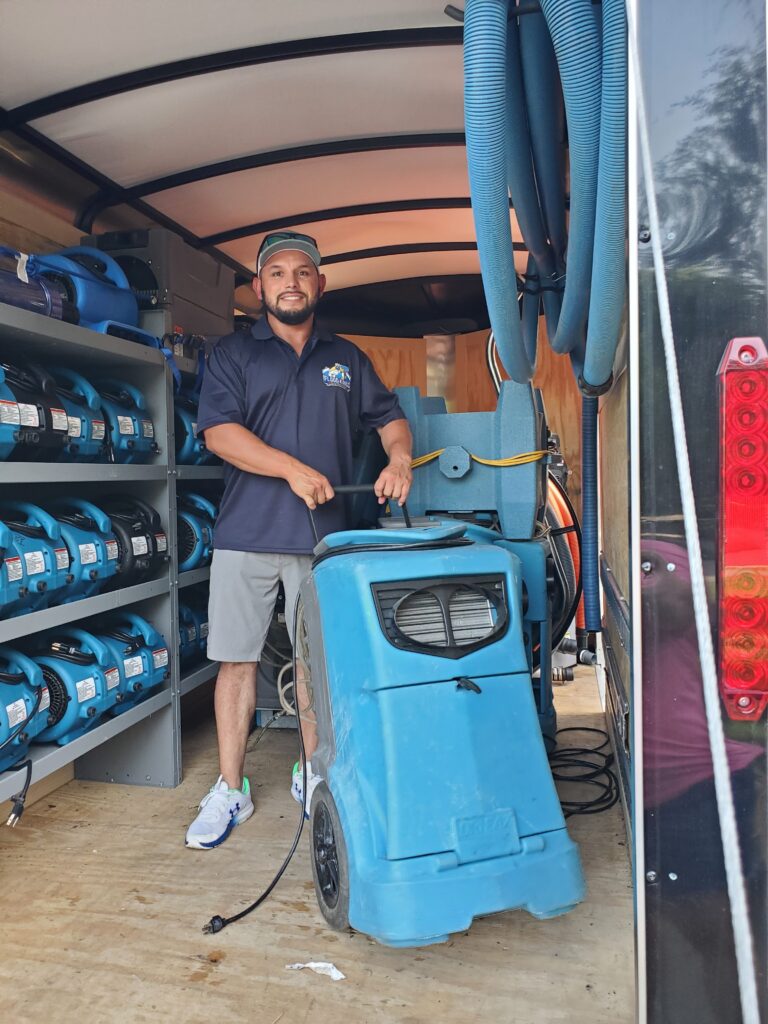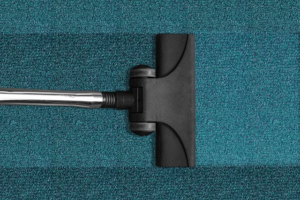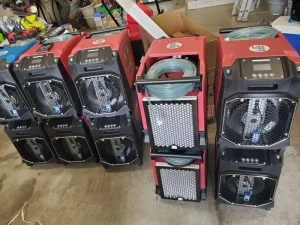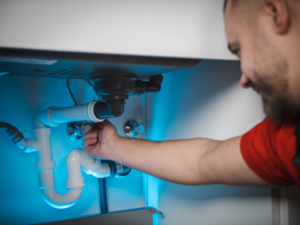As adverse weather conditions persist across the United States, bringing record rainfalls in numerous states, many homeowners will deal with water damage and basement flooding. Because of this, homeowners need to be prepared and know what to do in the event of a flooded basement.
Here’s a guide to show you how to fix water damage in the basement.
What Does Water Damage in the Basement Look Like?
You can often find the earliest evidence of basement water damage along your basement walls and floors. Most commonly, you can see discoloration or cracks running along either of these surfaces. Additionally, you may notice water seeping into the basement at the point where your walls meet the floor.
There are many less apparent signs that you could be dealing with water in your basement. Look out for:
- Mold and mildew
- A musty smell
- Chalky white stains (on concrete walls)
- Cracking drywall
- Flaking and peeling paint
- Uneven floor
Because water damage can be difficult to notice in your basement, you should aim to conduct monthly inspections. Pay special attention to appliances like your water heater.
If you see any signs of water damage, look into water damage restoration services from a company specializing in basement water damage repair to ensure your house is properly restored and free from structural damage, mold, and other health and safety hazards.
How Do You Fix Water Damage in the Basement?
If your basement flooding results from natural causes like heavy rains, you must prioritize your safety and wait until the flooding stops before trying to pump out the water.
If the water level in your basement is low enough that it won’t prevent you from safely operating pumping and drying equipment, you can try to drain your basement on your own. However, you are still strongly encouraged to contact water damage restoration services to assess the water damage.
Take the following steps to properly and safely fix basement water damage:
Take Safety Precautions
If there’s still standing water in your basement, you must take precautions to stay safe. You should cut off the electricity to your wet basement to avoid electrocution.
If you’re not sure how to do this safely, call an electrician. Wear slip-resistant rubber boots to wade around in the basement water while you work.
Document the Damage
The most important thing you can do to recover from a flooded basement is to document the extent of the basement water damage fully.
You must document all affected areas, belongings, and materials to file a basement water damage claim with your insurance company. Be sure to take plenty of pictures of the damage before you begin the cleaning process.
Many homeowners who experience basement water damage forget to do this each year are denied adequate financial assistance by their insurance companies.
Dry Out Your Basement as Quickly as Possible
To prevent further water damage, you must get your basement dry. You may need to rent a submersible pump or dry-wet vacuum from your local hardware store to remove excess water.
If you have more than a few gallons of standing water in your basement, call a water restoration company immediately, as it’s unlikely that you alone can dry out your basement quickly enough before severe structural damage occurs.
After thoroughly draining and wet-vacuuming the basement, you can help the basement dry faster by maximizing ventilation. Open up any doors and windows that lead to the basement. This is, of course, weather permitting. Avoid this if it’s raining or especially humid.
Next, bring multiple fans and dehumidifiers into the basement to help dry it out. The dehumidifiers pull water directly from the air while the fans create a constantly circulating current to help everything dry much faster. Be sure to empty the dehumidifier regularly.
Gut Your Basement
You must throw out anything in your basement that suffered extensive water damage or is still soaking wet. These materials will make it more challenging to get your basement completely dry, putting it at a higher risk for further water damage, mold, and mildew.
If there’s anything from your basement that you want to salvage, then you should wash it thoroughly and lay it out in the sun to dry.
Get Rid of Mildew and Mold Growth
Mold is one of the most common effects of water damage, especially in the dark, poorly ventilated parts of your home where moisture is prone to hang around, like basements.
The disgusting truth is that you’ll often be able to smell mold and mildew before you can see it. If you notice a strong, musty, or otherwise pungent odor coming from your basement, especially around drains, then there’s a good chance.
Mold thrives on porous materials, like your basement’s concrete walls, so check the walls carefully. Additionally, you should look for signs of mold on furnishings, like if you have curtains over your basement windows or rugs on the floors.
If you’re dealing with mold in hard-to-reach areas, or if mold covers more than 10 square feet of your property, you should call a professional mold remediation service to ensure all mold spores are killed, preventing health risks for you and your family.
Sanitize Your Basement of All Dirt and Debris
Even if you think the water that flooded your basement did not look especially dirty, it could have been filled with endless germs, wholly hidden from the naked eye. Because of this, it’s crucial that you clean and disinfect your basement to the best of your ability.
Use bleach and water mixes to thoroughly disinfect all of your non-porous surfaces. Additionally, you can use white vinegar and baking soda to neutralize stubborn odors that may linger even once your basement is fully drained and sanitized.

Start Water Damage Restoration
You should give your basement at least a week to dry before rebuilding it. You and your contracting team can get to work restoring your walls, floors, carpets, and any other element damaged by the flood.
Please address any issues that could lead to further water damage and flooding in your basement. Otherwise, all your hard work putting it back together will go to waste, and you’ll be forced to do it again.
If you have items you salvaged from the flood in your basement, you can bring them back in. Just ensure they’re completely dry, or they could become home to mold and mildew.
How Long Does It Take Water to Damage the Foundation of Your Home?
If your home’s foundation is intact, it would take months to cause severe damage to your home’s foundation.
However, if your foundation is compromised by cracking, water might only take a few days to damage it.
In the event of extensive water damage in your basement, always play it safe by calling a professional water restoration team that can adequately assess the extent of damage, restore your basement after damage, and give you prevention tips.
What Causes Basement Water Damage?
Once you’ve dried and restored your basement, you must protect yourself from future water damage. Here are some of the leading causes of basement water damage.
Poor Exterior Drainage
Your gutters are meant to prevent water from entering your house. Still, if they aren’t draining far enough away from the foundation, you could have some pretty regular flooding and severe basement water damage. To solve this, you must look into options like fixing your gutters to drain further from exterior walls or grading your yard to drain away from the foundation.
Burst Pipes
Burst pipes have the potential to cause a lot of basement water damage since the pressure can cause water to flow out very quickly, rapidly flooding your basement. To fix this, you need to shut off your water supply, get to work drying your floors, and call a water extraction and restoration service immediately.
Plumbing Problems
This is the most dreaded cause of basement water damage. If you are experiencing a sewage backup, you must shut off your water and contact professionals immediately. Not only is this a vast and taxing project to handle on your own, but the nature of the water poses the risk of contamination, spreading germs throughout your home if the issue is not dealt with correctly.
Leaky Windows
Windows are a great way to get natural light into an otherwise dark and dreary basement. Unfortunately, over time, the seals on basement windows can grow weaker and begin to leak, causing basement water damage.
Basement Wall and Floor Leaks
If you have water leaking through the floors or down the walls of your basement, you must contact someone experienced in water damage restoration. Not only could this issue be causing a lot of invisible damage, but it could also be a sign of problems with your home’s foundation. A professional will be able to fully assess the damage and give you an estimate of how much the repairs will cost.
Appliance Leaks
For most homeowners, the basement is home to essential appliances, and it’s often a place for washer, dryer, or water heater hookups.
Unfortunately, these appliances are often the cause of basement water damage. Their hoses can quickly become unattached or spring leaks, spraying water everywhere and creating puddles in your basement.
If this is an issue you commonly face, you should keep a roll of plumber’s tape near these appliances so you can quickly wrap the hoses when they spring a leak. Additionally, you can use zip ties to hold hoses in place and keep them from pulling away from appliances as easily.
Cracks in the Basement Walls
Hydrostatic pressure is the pressure of standing water pushing against whatever blocks it. This pressure can cause water to seep through the concrete of your basement walls, especially if they are already cracked. To keep this issue from becoming worse, you must fill any cracks in your walls or floors with hydraulic cement to block the water and keep your basement dry.
Malfunctioning Sump Pump
If your basement floods and your sump pump isn’t working as expected, you’ll likely have standing water in the basement, causing incredible water damage.
How to Protect Your Basement Against Future Water Damage
After spending a lot of time and money repairing your basement after water damage, investing in extra damage control around your property is wise to avoid doing it all over again.
To prevent basement water damage in the future, do the following:
- Recaulk your windows – You should reseal any cracks around their borders. Additionally, you should regularly clean window wells to keep them from clogging with leaves and other natural debris. You should also consider adding covers to your window wells for an additional layer of protection.
- Keep your gutters clear – If water can’t drain properly out of your downspouts, it may pool around the exterior of your home, seeping through cracks or leaky windows.
- Regularly inspect your sump pump – Sump pumps are meant to prevent basement flooding, pumping out water as it enters your basement. Of course, if the sump pump is not functioning correctly, your basement will continue to fill with water. Your sump pump should last about ten years, so if yours is reaching the end of its lifespan, replace it before you have a disaster.
Basement Water Damage FAQs
Can a One-Time Water Leak Cause Mold?
Yes — if a water leak is not properly dried and fixed, mold can colonize spaces surrounding the site of the damage and spread behind your walls and under your flooring.
How Do You Know If Basement Water Damage Is Serious?
Basement water damage is serious if you notice the following:
- Mold growth and/or a musty smell
- Warped walls or wood rot
- Cracked walls
- Flaking paint or wallpaper
Water damage that goes ignored can cause severe damage, even if you don’t notice any of the above symptoms. Make it a habit to routinely check your home, including your attic, basement, and crawl spaces, for any sign of hidden water damage.
Does Basement Water Damage Eventually Go Away?
No. If you don’t take action to fix the water damage in your home, it will only get worse, leading to structural damage and toxic mold growth that can be harmful to you and your family.
How Do I Keep My Basement Dry?
You can keep basement water at bay by doing the following:
- Insulating your cold-water pipes
- Improving ventilation
- Using a dehumidifier
- Waterproofing your walls and floors
- Maintaining drains and gutters
- Installing and maintaining a pump
For Fast, Stress-Free Water Restoration, Call Flood Kings
In the event of water damage in your basement, the most important thing to do is immediately take action. To get back to normal life in your house as soon as possible after basement water damage, call Tennessee Flood Kings for fast, reliable water extraction, mold removal, and basement flood restoration.
Book us online, or call our 24/7 emergency line at 615-477-9968.









